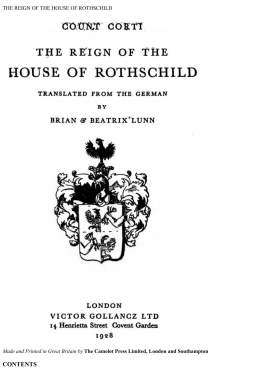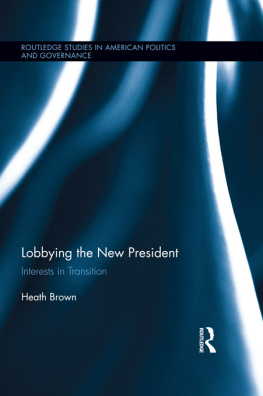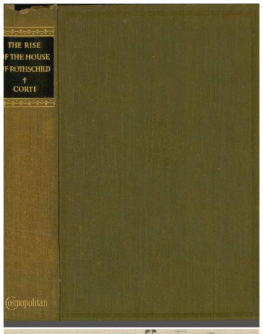THE REIGN OF THE HOUSE OF ROTHSCHILD
Made and Printed in Great Britain by
The Camelot Press Limited, London and Southampton
CONTENTS
Foreword
LIST OF ILLUSTRATIONS
Frederick William III of Prussia |
The Frankfort Bourse |
Saphir |
Perier |
Opening of the Stockton and Darlington Railway, 27th September, 1825 |
Travelling on the Liverpool and Manchester Railway, 1831 |
Trial Trip of the first Austrian Railway, 14th November, 1837 |
Franz Riepel |
Opening Ceremony of the Kaiser Ferdinands Nordbahn, 7th July, 1839 |
Queen Marie Christine of Spain |
Count Toreno |
A Rothschild billet d'entree |
Thiers |
Heine |
Pius IX |
Achille Fould |
Napoleon III |
Bismarck |
Meyer Carl, Baron Rothschild |
Cavour |
Cartoon representing the Visit of Napoleon III to James Rothschild at Ferrieres on 17th February, 1862 |
The Brothers Pereire |
The Empress Eugenie |
Baron Lionel de Rothschild |
FORWORD
This volume carries on the history of the House of Rothschild as revealed by the relevant documents up to the Peace that concluded the Franco-German war in 1871. In the writing of this volume, as in the case of The Rise of the House of Rothschild, the Rothschild family have brought no influence of any kind to bear; my aim has been to portray without prejudice or partiality the positively fabulous part which the House played in the events of the nineteenth century. Original documents and letters that had been intercepted have occasionally afforded particularly illuminating revelations, although in the case of extracts from some of the letters it is necessary to bear in mind that the originals were probably carefully altered by the Rothschilds themselves, with the deliberate intention of making upon persons like Metternich a definite impression such as would assist them in carrying out their plans. Seen in this light, they are no less instructive and characteristic of the methods of the House "than the more ingenuous documents which undoubtedly constitute a large proportion of those used in this work.
I must again point out that I cannot claim to have dealt with the subject exhaustively; but it has perhaps been possible, by means of the many thousand documents that have been collected, to present a series of varied but relevant pictures such as may afford a general impression which, in its surprising and fantastic effect, should give some idea of the nature, the work, the aims, and the power of this House during the nineteenth century.
The Epilogue, which appears at the end of the book, of course makes no claim to continue the treatment of the subject on the same lines; it merely attempts to bring put one or two of the more striking moves executed by the House of Rothschild on the political chessboard during the sixty years leading up to the present day moves which show how the House, in spite of growing difficulties, vanishing influence, and the powerful competition of younger and richer firms, has endeavoured until the most recent times to maintain its position, to influence international politics, and, although with diminishing success, to drive them along the path which corresponded to the interests of the bank.
As in the case of the first volume, I have to express my gratitude to a large number of persons who have assisted me in my work.
In addition to those persons mentioned in the first volume, I am also indebted to Professor W. Alison Phillips, and to the gentlemen of the Record Office and of the British Museum in London, who were particularly kind in the assistance they gave to me, a foreigner. Further, I am indebted to Dr. von Kurzl-Buntscheiner; to the expert writer on economic subjects, R. Drapala; to the legal authority, Herr von Meyer-Leonhard of Frankfort; and finally to Fraulein Lilli von Werner, the daughter of the painter Anton von Werner; who have all been most obliging in placing documents and portraits at my disposal.
I can but conclude by expressing the hope that this volume, which in my opinion reveals, as few others have done, the intricate activities of high politics as intimately observed from behind the scenes, will have a wide appeal.
Meyer Amschel Rothschild, the son of a small Jewish retailer and moneychanger, who lived in the Frankfort Ghetto, was the founder of the Rothschild Bank, which became an important concern towards the end of the eighteenth century, especially as the result of the wars following upon the French Revolution. Meyer Amschel came into touch with Court circles through dealing in old coins and antiquities, and established a special relationship with the Elector of Hesse, whose property he looked after to a great extent during the Napoleonic Wars, where he acquired credit, important connections, and financial profit. He employed his five sons in the family business. The House, which had become rich, made itself generally useful to Napoleon's enemies. His most gifted son, Nathan, who had emigrated to England, played a particularly important part in these transactions. His second son, James, under the ingenious pretext that he was acting in France's interests, ventured to go to Paris, but remained in constant touch with Nathan, who was in the enemy country of England. When Napoleon fell, the Rothschilds showed their hand and openly joined the side of the victorious Allies. During the Napoleonic Wars they had become immensely wealthy, particularly through handling the British subsidies to the Allies, with the result that they were able out of their own resources to assist with loans the States that had been impoverished by the war. Austria was one of the candidates for a loan, and in 181 country ennobled the Rothschilds in order to put them, under an obligation, afterwards inducing Solomon, on the conclusion of a loan operation, to settle in Vienna, in which city he resided permanently, becoming the confidential adviser of the all-powerful Metternich. When, in 1820, Metternich wished to suppress the Revolution at Naples, which had no money to deal with the problem itself, Metternich sent the fifth brother, Carl Rothschild, to Naples, where he carried through ingenious arrangements whereby that State was herself forced to raise loans to defray the costs of the invasion. Thus, besides the original House of Frankfort there were now four branches, in London, Paris, Vienna, and Naples, each of them being managed by one of the five brothers, who worked in complete harmonious co-operation.
Up to the year 1830 the wealth of the Rothschilds had constantly and prodigiously increased, and they now possessed a virtual monopoly of State loans, which they arranged for all the great Powers of that period. The Rothschilds had just underwritten three important loans for France, Austria, and Prussia, and had not completed their flotation, when the July Revolution broke out quite suddenly and unexpectedly in 1830, with the result that Charles X lost his throne, and the House of Rothschild, with its large holdings of Rentes, which had suddenly fallen enormously in value, was faced with a serious crisis. The five brothers, however, courageously set about the task of saving the existence of this World House.
At this point the story as contained in the second volume
Next page






